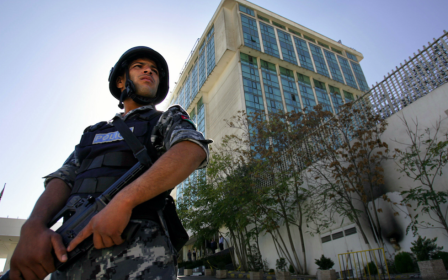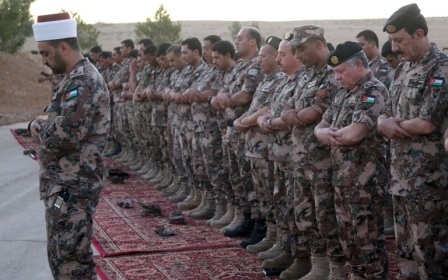Jordanian spies sold Syrian rebel weaponry on black market: Report

Jordanian intelligence officials stole weapons the Central Intelligence Agency tried to ship to Syrian rebels and sold them instead on the black market, according to a joint report by New York Times and Al-Jazeera.
The stolen weapons are believed to be connected to an attack on a police training facility in Jordan's capital of Amman last November in which two Americans, two Jordanians and one South African were killed, according to a months-long FBI investigation cited in the report.
The weapons were part of a joint CIA-Arab intelligence services training programme, which started in 2013, aimed at building up forces fighting against the Syrian government in the country.
The training programme is classified in the US and a government secret in Jordan. It is separate from the now-defunct programme to train fighters battling the Islamic State militant group.
The Jordanian officials sold millions of dollars of weaponry, ranging from Kalashnikovs to RPGs sourced mainly from the Balkans and Eastern Europe, according to the report.
Those involved bought themselves expensive cars, phones and other luxury items, according to Jordanian officials quoted in the report.
The investigation and a subsequent crackdown on the activities followed intense Saudi and American pressure as well as reports that had been circulating for months inside the Jordanian government that corrupt officials were selling these weapons on the black market.
Jordanian government spokesman Mohammad al-Momani denied that Jordanian intelligence officers were involved in weapons trafficking, telling the New York Times: “Weapons of our security institutions are concretely tracked, with the highest discipline.”
The issue is a sensitive one in Jordan not only because of the strong, decades-long relationship between the US and Jordan. It's also a significant issue because of the important role played by the Jordanian intelligence services - or General Intelligence Directorate - which is second only to the king in terms of seniority in the kingdom.
It is “a world-class, reputable institution known for its professional conduct and high degree of cooperation among security agencies,” al-Momani told the New York Times.
Husam Abdallat, a high-ranking advisor to past Jordanian premiers, conceded that there are some corrupt officers in the GID, but insisted that: “The majority of its officers are patriotic and proud Jordanians who are the country’s first line of defense.”
The admission of corruption is unsurprising given that two GID bosses have been jailed since the 1990s in cases of multi-million dollar fraud.
Two recent heads of the organisation have been sent to prison on charges including embezzlement, money laundering and bank fraud.
General Samih Battikhi, in charge of the GID from 1995 to 2000, earned around $25m from a scheme involving bank loans and fake government contracts. He was sentenced to eight years in prison, later reduced to four.
General Mohammad al-Dahabi, who was in charge from 2005 to 2008, was convicted of stealing millions of dollars seized from Iraqi citizens crossing into Jordan following the 2003 US invasion of Iraq, as well as selling Jordanian citizenship to Iraqi businessmen. He was sentenced to 13 years in prison.
Responding to the report, US State Department spokesman John Kirby said: “The United States deeply values the long history of cooperation and friendship with Jordan. We are committed to the security of Jordan and to partnering closely with Jordan to meet common security challenges.”
New MEE newsletter: Jerusalem Dispatch
Sign up to get the latest insights and analysis on Israel-Palestine, alongside Turkey Unpacked and other MEE newsletters
Middle East Eye delivers independent and unrivalled coverage and analysis of the Middle East, North Africa and beyond. To learn more about republishing this content and the associated fees, please fill out this form. More about MEE can be found here.




